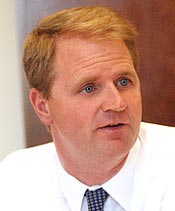UC holds the line on health costs for 2009
Most employees will pay less in premiums than in 2008, or only slightly more, thanks to the UC system’s infusion of cash support
| 15 October 2008
 Nathan Brostrom (Peg skorpinski photo)
Nathan Brostrom (Peg skorpinski photo)BERKELEY — At a time when the global financial system is teetering and the price of everything seems to be heading north, UC employees can take comfort in at least one piece of fiscal news. Not only do they still have their health benefits, but the cost is likely to be lower in the coming year than it was in 2008.
The UC Office of the President announced last week that despite a $91 million jump in systemwide premium costs — an increase of 8.9 percent over the previous year — a one-time subsidy of $5.2 million will offset rate increases for most UC employees, who otherwise would have felt a stronger pinch in their monthly paychecks.
The infusion of funds, explained Nathan Brostrom, Berkeley’s vice chancellor for administration, was a result of chancellors and vice chancellors throughout the system suggesting to UCOP that “this is a tough fiscal environment for everyone, so anything we can do to mitigate these costs will be very, very beneficial for employees.”
The system responded, Brostrom said, with the subsidy as a buffer to spare many UC staff from premium hikes. Under UC’s health-benefits system, the university contributes a substantially greater portion of premiums for lower-paid employees than it does for higher-paid staff. For some 42,000 UC workers, anywhere from 91 to 96 percent of their monthly premiums are paid by the UC system; the 5,000 top-earning employees are subsidized up to 75 percent.
 Mark Yudof
Mark Yudof “We recognize how important good health benefits are for our employees and their families, especially our lower-paid employees who are hit hardest by escalating healthcare costs, and we continue to work very hard to ensure they have access to quality health benefits,” UC President Mark Yudof said in announcing the step. With the additional one-time subsidy, approximately 36,000 of UC’s 110,000 employees covered by UC medical plans, including roughly 21,000 lower-paid staff, will see a decrease in their 2009 net monthly rates as compared to 2008. For example, employees earning less than $46,000 in the UC Kaiser plan will see a 6.8 percent (44 cents per month) reduction for single coverage, and a 17.9 percent ($3.38 per month) decrease for family coverage.
Employees participating in other plans, added Brostrom, will also see either cuts in their monthly premiums or small increases, depending on the particular plan and whether they’re enrolled as individuals or families. No one in “pay band 1” — a category that includes 42,000 lower-paid staffers systemwide — will see an increase of more than $4.20 a month. Most are expected to see a small decline or pay the same amount as in 2008.
Even before the credit crisis hit, Sacramento was beset by budget woes, and UC campuses were bracing for cutbacks. The extent of the pain won’t be clear until the regents adopt a budget in November, but substantial salary increases are probably not in the offing.
“Expenses are rising everywhere you look,” said Brostrom, a key player in the campus’s efforts to cope with cutbacks in state funding. “So there was a feeling that if we could constrain the rise in health insurance, that would make a meaningful difference for our employees.”
Brostrom noted that the one-time subsidy is coming from UC medical reserves “that are prudent to carry in a health-benefit system this large.”
“But my view,” he added, “is that if you’re not using reserves in a fiscal environment like this, when are you going to use reserves?”

